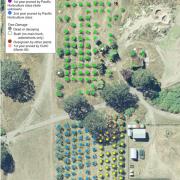Apple Orchard
In 2008, a group of Environmental Studies students in ES 341, Ecological Restoration, initiated an agricultural restoration project on the neglected CJVI Lands apple orchard. Their intention was to reconnect university course-work to the university's landscape through hands-on, experiential learning. They pruned 14 trees and built bee boxes to encourage pollination. One of these students, Ellie Knight, produced the map below to record which trees have been pruned and by whom.
Content contributed by Alex Schiebel and Adrienne Macmillan
CJVi Agriculture Proposals
Welcome to the CJVI lands! CVJI consists of 30.7 acres of fallow land on the edge of campus at Cedar Hill X Road. It encompasses an old orchard (see Apple Orchard), groves of Garry Oak trees, and large open fields used primarily by dog-walkers, Frisbee golfers, and bike jumpers.
Land-use planning for the CJVI lands have been a contentious issue since 1997, when student groups began advocating for restoration of the landscape's agricultural heritage. This page was created to help past and present visions for the landscape inform future land-use decisions.
Past Visions
Camassia
In 1997, the Camassia Learning Centre for Sustainable Living was initiated by a group of student activists at the University of Victoria (UVic), begun under the premise that theory needed to be united with practice, thinking with doing, and teaching with learning.
Camassia advocates saw the CJVI landscape as an opportunity to create a land-based education facility where students could come to learn and model ecologically sustainable ways of living in areas of housing, energy, agriculture, waste management, water conservation, habitat restoration, and co-operative, consensus based management. They proposed a variety of initiatives including:
•Restoring the existing apple orchard.
•Community demonstration gardens modeling permaculture design (i.e. meant to mimic ecological systems).
•A “Cool-Aid Mini-Farm” supplying produce, growing space, and hands-on skills to street people and at-risk individuals.
•Allotment gardens for surrounding community members.
•Habitat restoration adjacent to Mystic Vale.
•A native plant nursery.
•Alternative energy, water management, and natural building projects.
•Pairing with elementary and secondary school groups to offer a “living classroom” (1).
Camassia envisioned these initiatives as a basis from which students and faculty could work to conduct their own applied research, organize or facilitate workshops, and create new credit or non-credit courses rooted in material simplicity, ecology, and community spirit.
The proposal was rejected by UVic Facilities Management, citing liability concerns and the project extending beyond an established curriculum (2).
 (3)
(3)
Uncommon Ground
In 2003, Michael M’Gonigle and Jason Found of the Polis Project on Ecological Governance, UVic, released Uncommon Ground, a report on “creating complete community” at the University of Victoria. They proposed the CJVI Lands become a “living laboratory” for an interdisciplinary project that would address issues surrounding sustainable human settlement, as well as provide practical solutions to complex ecological and social problems. They envisioned the creation of a Centre for Sustainable Systems that would incorporate programs in:
•Urban Agriculture and Food Studies.
•Habitat Restoration.
•Water and Energy Management (both in terms of technical skills and the study of cultural and governance aspects of usage).
They maintained that the absence of an agriculture program at UVic was beneficial, as it would allow future “Food Studies” to develop free of past ideologies. Uncommon Ground saw Urban Agriculture on campus as a way to take Victoria’s “Garden City” reputation beyond mere beauty, forward to an innovative landscape scale, enlivening social learning in the process (4).

Uncommon Ground: Re-conceptualizing the University Landscape (5)
Future Visions
CUAC
The Campus Urban Agriculture Collaborative formed in January, 2009 to initiate another proposal for an agricultural centre on campus. See video below for their vision.
Content contributed by Alex Schiebel and Adrienne Macmillan

